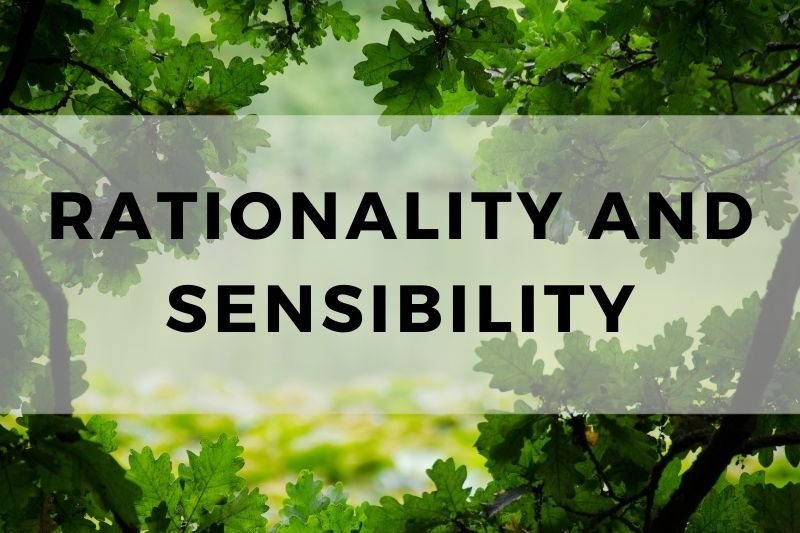
Rationality and sensibility are two fundamental aspects of human thought. They shape how we process information and make decisions. Rationality is the ability to reason logically and make objective judgments. Sensibility, on the other hand, is connected to our emotions, intuition, and subjective experiences.
While these two concepts may seem distinct, they often interact and influence each other. Understanding their relationship is crucial for navigating life effectively. This article explores the connection between rationality and sensibility, highlighting how they work together in various aspects of our decision-making and daily experiences.
Defining Rationality
Rationality refers to the capacity to think logically and make decisions based on reason rather than emotions or impulses. It involves using evidence, analysis, and consistency to reach conclusions. Historically, philosophers have explored rationality in different ways. René Descartes emphasized doubt and systematic reasoning, famously stating, “Cogito, ergo sum” (“I think, therefore I am”). Immanuel Kant saw rationality as essential to moral decision-making, grounded in universal principles. Meanwhile, Baruch Spinoza connected rationality with understanding nature and the universe through clear, logical thought. Across these views, rationality is seen as a guiding force for making sense of the world and directing human action.
Defining Sensibility
Sensibility is the ability to perceive and respond to emotions, sensations, and intuitions. It involves not just rational understanding but a deep connection to personal feelings and external stimuli. This concept emphasizes the importance of emotional awareness and empathy in human experience. Philosophers like David Hume and Jean-Jacques Rousseau highlighted the role of sensibility in shaping moral judgments and personal connections. Hume argued that emotions, rather than reason, drive our actions and decisions. Edmund Burke expanded on this by associating sensibility with aesthetic and moral experiences, suggesting that beauty and virtue are felt rather than reasoned. Sensibility ties our inner world to the outer world, influencing how we interact with both.
The Intersection Between Rationality and Sensibility
#1. Emotional Intelligence
Emotional intelligence is the ability to recognize, understand, and manage both our emotions and the emotions of others. It is a combination of rational thought and emotional awareness. Rationality allows us to logically analyze our emotions and the emotions of those around us. Sensibility, on the other hand, lets us feel and empathize with these emotions. The interaction between these two allows us to respond more thoughtfully and appropriately to emotional situations, both personally and socially.
#2. Practical Decision-Making
In everyday life, our decisions are rarely purely logical or purely emotional. Rationality provides the framework for analyzing choices based on facts and logic. Sensibility brings in emotional insights, helping us gauge the human or emotional impact of those decisions. By blending both, we are able to make decisions that are not only logically sound but also considerate of the people involved and the feelings at play. This approach leads to more well-rounded, effective choices in personal, professional, and social contexts.
#3. Ethical Judgments
Ethical decisions are often not as simple as applying a set of rules or principles. Rationality helps us understand and apply moral frameworks, such as utilitarianism or deontology, to assess what is right or wrong. Sensibility, however, connects us to the human side of ethical issues. It helps us feel empathy and consider the real-life consequences of our decisions on others. The fusion of rational thinking with emotional insight creates a deeper understanding of ethical matters, guiding us toward more thoughtful and compassionate decisions.
#4. Thought and Feeling Balance
A balance between rational thought and emotional awareness is key to making sound decisions. Rationality helps us remain objective, ensuring we don’t make decisions based solely on transient emotions. Sensibility, on the other hand, ensures that our emotional and intuitive responses are considered, allowing us to be more humane in our choices. Striking this balance improves decision-making by making it both logical and emotionally intelligent, ultimately leading to more effective outcomes in complex situations.
#5. Problem-Solving
Effective problem-solving involves both clear logical thinking and an understanding of the emotional or social aspects of a situation. Rationality allows us to break down problems systematically and approach them in a methodical manner. Sensibility helps us understand the emotional dynamics involved, such as the impact on people or the mood of a group. Together, they offer a more comprehensive problem-solving approach, addressing both the practical and emotional components of any challenge, leading to better solutions.
#6. Human Experience
The intersection of rationality and sensibility shapes our daily human experience. Rationality allows us to understand and navigate the world through logic, helping us make sense of complex issues. Sensibility connects us to the emotional and sensory aspects of life, allowing us to experience joy, pain, empathy, and connection. Together, these forces guide how we perceive, interpret, and react to the world, enriching our experiences and helping us navigate the challenges of life with both clarity and depth.
#7. Communication
Effective communication requires both clear logic and emotional sensitivity. Rationality ensures that our message is clear, structured, and well-argued, while sensibility helps us understand the emotional state of our audience. This combination allows us to convey our thoughts in a way that resonates emotionally, fostering deeper understanding and connection. In both personal and professional contexts, this blend of rationality and sensibility enhances communication and ensures that our message is both understood and felt.
#8. Rational Self-Reflection
Rational self-reflection involves analyzing our thoughts, behaviors, and decisions objectively. It helps us understand our strengths, weaknesses, and areas for growth. Sensibility plays a crucial role in this process by allowing us to engage with the emotional aspects of self-reflection, such as feelings of guilt, pride, or regret. Together, these elements allow for a more balanced form of introspection that leads to greater self-awareness, emotional growth, and personal development.
#9. Adaptability
Adaptability requires both rational thinking and emotional insight. Rationality helps us assess new situations, analyze available options, and develop effective strategies for change. Sensibility, however, helps us understand the emotional shifts that come with change and allows us to respond appropriately. By combining both, we become better at adjusting to new environments, whether they are social, professional, or personal, ensuring that our responses are both practical and emotionally intelligent.
#10. Creativity and Innovation
Creativity thrives at the intersection of rational thought and emotional insight. Rationality helps us organize, structure, and refine creative ideas, while sensibility provides the emotional and intuitive spark that fuels innovation. By combining the clarity of rational thinking with the depth of emotional experience, we can push the boundaries of what is possible, creating solutions and ideas that are both practical and meaningful. This combination fosters an environment where new ideas flourish, leading to breakthroughs in art, technology, and problem-solving.
Closing Thoughts
Rationality and sensibility are not opposing forces; rather, they complement each other in shaping our decisions and experiences. While rationality provides structure and logical clarity, sensibility adds depth and emotional understanding. Together, they guide us in making balanced, thoughtful choices in all areas of life.
Whether in communication, problem-solving, or ethical decisions, the interplay between these two aspects of human thought enriches our understanding of the world. Embracing both rationality and sensibility enables us to navigate life’s complexities with wisdom and empathy, creating a more holistic approach to decision-making and personal growth.
